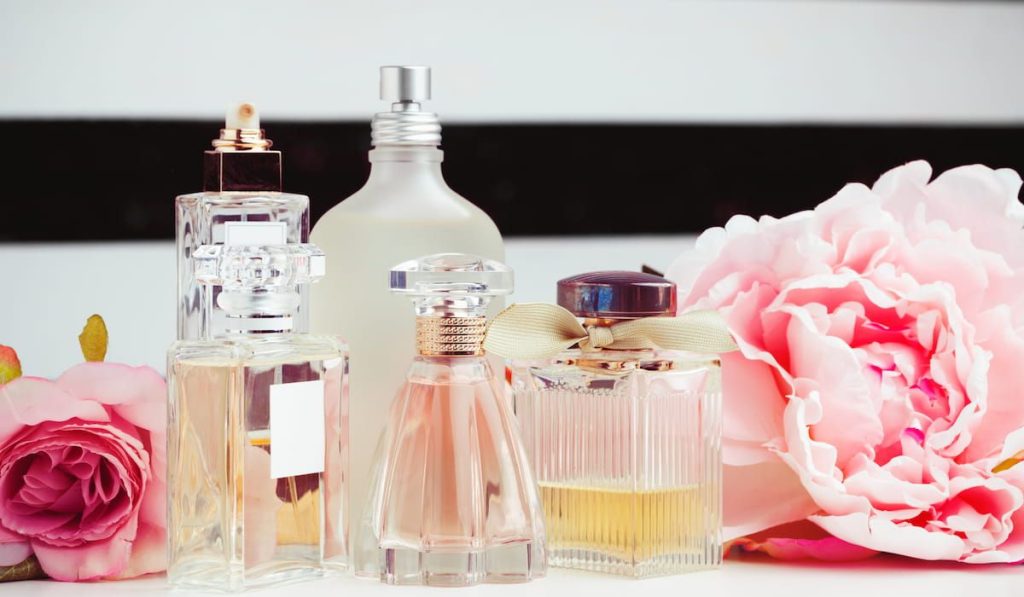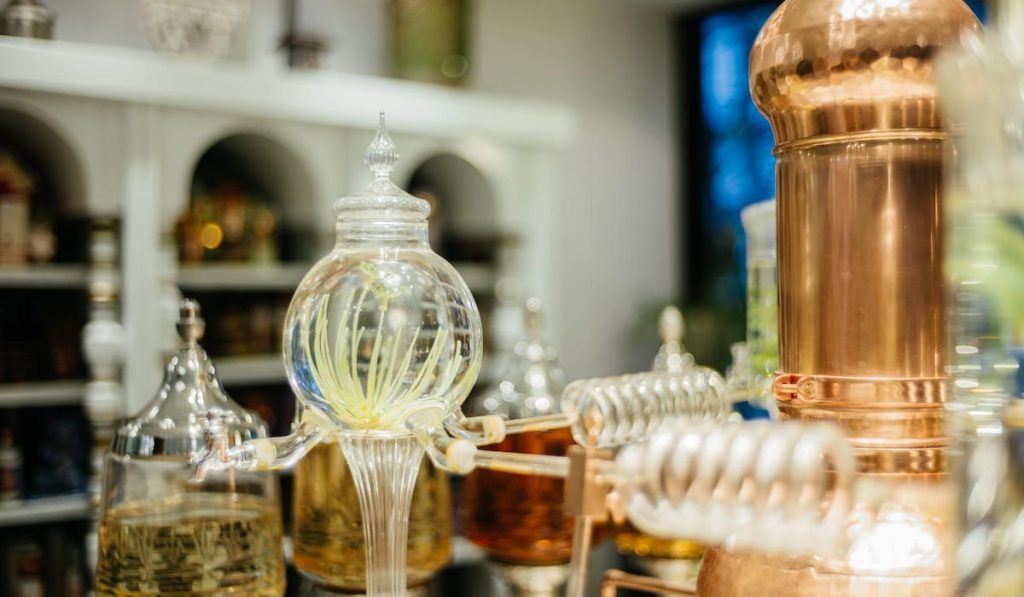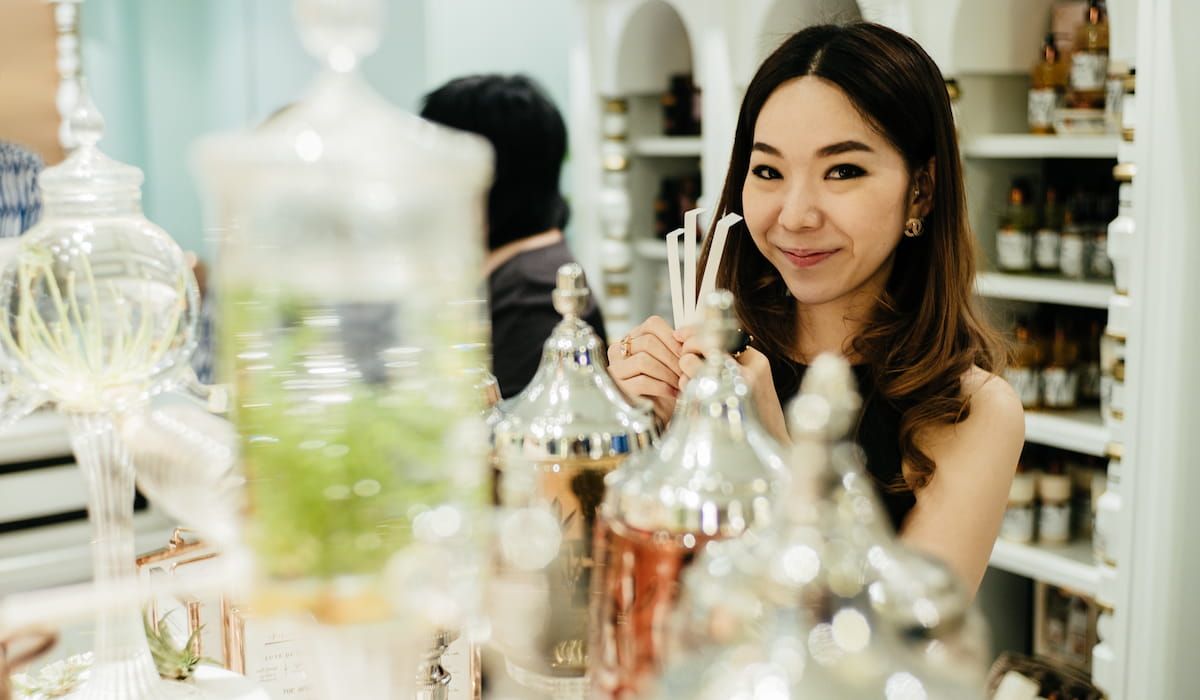Are you interested in essential oils, fragrances, and botanicals? An amateur chemist looking to experiment? Or perhaps you are finding the latest Eau du Toilette just a little bit too pricey and think you can save a few dollars by making one yourself?
All sorts of people take up the enduring hobby of perfume making for the reasons mentioned above and more. It is a fascinating pastime and requires patience diligence and a willingness to research and learn. The rewards are creating beautiful fragrances that may even be more healthful than commercial cosmetic products that can cause allergies and irritation.
Delving into perfume making is a journey through thousands of years of history and culture as almost every people group will have some expertise in the creation of fragrances. Contemporary perfume-making is as scientific as it is creative, meaning that this is a rich hobby that you can take in a variety of directions.
In this concise guide, we will explore hobbyist perfume making and the options you have to become established as an amateur perfumer. We packed this article with resources and links to direct you to organizations and groups that will be of interest and outlined the basic equipment and resources needed to start creating beautiful fragrances you and your loved ones can enjoy.

Let’s Start at the Beginning. What is Perfume?
A perfume is a fragrant mixture of essential oils or aromatic elements and compounds, which are combined in a solution (aqueous, or some other solvent), and used for their pleasing scent.
The substances used may be naturally occurring or, as in modern forms of perfume manufacture, synthetically produced. There is no one specific type of perfume, both the fragrances and the methods of their preparation can vary widely.
As you will find in exploring perfumery, the experience of different smells is highly subjective, and a perfumer often needs to have a nuanced approach to their creations.
A Perfumery Hobby Builds on a Rich Tradition of Composing Fragrances that Spans Centuries.
The creation of sweet-smelling concoctions is as old as mankind and spans millennia. Ancient artifacts and archeological digs show evidence of fragrance making and other apothecary activity in the so-called “cradle of civilization” in the Indus Valley.
Civilizations and empires spanning Egypt, Israel, China, Southern Africa, and more have yielded evidence of distillation and storage of essential oils, resins herbs, and spices like the Frankincense and Myrrh of the three wise men.
Such pungent substances would be diluted and preserved in alcohol or oil and used for oblations or purification purposes.
Persians perfected the art of steam distillation using techniques that laid the foundation for much of modern chemistry.
The Greeks and Romans were particularly adept at storing perfumes in sculpted jars of alabaster and other types of stone or clay.
Later, European royalty became the primary patrons of monks, apothecaries, and other artisans who were adept at creating fine fragrances.
The use of these rarefied preparations was a readily appreciated indicator of status and wealth. The Renaissance paved the way for the wider use of perfumes for masking body odor and the first Eau de Cologne was created in 17th century Italy.
With the increasing demand for perfumes, came an expansion in the cultivation of the botanicals used in their formulation. Italy and France in particular have retained global pre-eminence for the commercial production of fine fragrances to the present day.
The methods used in creating a winning perfume have not changed in centuries and it is some of that knowledge and expertise that you will be making your own as an amateur perfumer.
Are You up for Making the Next Chanel No. 5? Great Reasons to Make Perfume-Making Your New Hobby.
- A perfume hobby enables you to enjoy the allure and glamour of fine fragrances
If you love the world of fashion and fragrance, exploring perfumery will increase your understanding of what goes into a great fragrance. By learning about and experiencing a variety of scents you will refine your taste in perfumes and be fully equipped to recreate some of the world’s most iconic scents.
Becoming a Nose or Nez is a rarified honor in French culture for those with discerning taste in fragrance and your explorations in scent will notably attune your olfactory skills.
- Learn more about natural aromatics with hobby perfumery
Essential oils have become more mainstream in recent years and your perfumery hobby will equip you with the expertise to put them to good use in a variety of perfume preparations.
As more and more people are looking for fragrances and other cosmetic products which have natural ingredients you may find that you are requested to create unique fragrances featuring botanical blends that are chemical-free.
- You could create a home lab for your perfume making projects
Though you do not need a degree in organic chemistry: Mastering the technicalities of perfume-making may necessitate using chemistry equipment.
Test tubes, glass droppers, and condensers may be recruited for your perfume making project and well-calibrated measuring equipment is likely to be vital for the precision dilutions that make all the difference in creating a winning scent.
- Hobby perfumers can produce skin-friendly fragrances
If you or loved ones suffer from eczema or other skin allergies or sensitivities, perfume may have been something to be avoided.
Alcohol, chemically formulated fragrances, and preservatives are known to be problematic for many people and this often spurs amateur perfumers to make a perfume that limits or removes these substances completely.
By studying the art of creating fragrances you can learn what exactly goes into a perfume and create blends that are potentially free of substances that will irritate your skin.
- If you are a fragrance enthusiast transitioning to DIY fragrance may save you money long-term
Fraygs (fragrance or perfume addicts) can spend thousands on a store-bought designer fragrance collection or stocking up on bottles of an elusive and exclusive fragrance they love.
If you are able to precisely pinpoint the aroma families that you like, you may be able to create your own signature scent, drawing on the composition of fragrances you already own.
Acquiring the beakers, funnels, and bottles as well as fragrances and aromas can initially be expensive but if you find something that works, you just need to maintain your supplies.
- You could be the next Jo Malone!
Starting out in perfume making could open the door to a new business or career. Many famous perfumers like Jo Malone, started out making their now renowned fragrance blends at the kitchen sink.
Pleasant, unique fragrances will always be in demand, and you may want to take your pastime in the direction of selling small quantities at crafts fairs or online.
People appreciate and delight in fragrances that have been produced with passion flair and care, with traceable, ethical ingredients so you may find that your new hobby becomes a lucrative side hustle quite quickly.

What Does Hobby Perfumery Involve?
- It all starts with your Nose!
After all, the key to creating a beautiful perfume will be the aromas you combine. Your first step will be to find out the aroma families you enjoy, which may take time. You will probably draw your scents from aroma groups like:
- Citrus
- Green
- Floral
- Animal/Musk
- Gourmand
- Earthy
- Woody
Trying everything out can prove expensive so research, advice, and some carefully considered purchases are the way to go.
It is wise to invest time in this stage as you will be so much more informed on how a successful perfume is composed. Once you know what kind of fragrance projects you want to complete, you are ready to source the fragrances and aromas you will need.
Suppliers of these niche substances are often very helpful in assisting you in finding the exact aroma you need if you describe what you are trying to achieve.
- Start experimenting with essential oils and progress to aroma chemicals
Amateur perfumers usually work with either natural oils or aroma chemicals. For some novice perfumers, natural oils may be better to work with initially as you will require less essential oil to create a reasonable fragrance.
The downside is the fragrances made with essential oils can be perceived as being rather dowdy or traditional but working with aroma chemical is more technical and you may need a broader range of scents to compose a successful perfume.
- Create a home laboratory or scent organ for your amateur perfume-making hobby!
A big part of your hobby will be assembling and curating a collection of scents to blend.
With these aroma chemicals or naturals, you can create your scent organ, a library of fragrances from which you can weigh and compose your fragrances. You will need to source:
- Aroma and flavor molecules and concentrates (you can buy kits that include small quantities of over 100 distinct aroma chemicals)
- Bases and blends (often 200-proof alcohol or jojoba)
- Fragrance oils
- Carrier and diluting oils
You will also need key items of perfume-making hardware for your hobby, including:
- Weighing scales (with a precision of at least 0.01 gram)
- Weighing boats
- Clean dark glass bottles
- Notebook and pencil – vital for recording what works and what doesn’t.
- Labels
- Pipettes
- Scent strips – for sniffing your olfactory creations!
Ensure that you never mix your perfumery supplies and equipment with food preparation. Also always smell fragrances from a scent strip rather than out of the bottle to preserve their shelf life.
Your supplies should be stored well away from direct sunlight and extremes of temperature which can also cause them to deteriorate.
- Buying a perfume-making kit can get you off to a good start.
Assembling a collection of aroma chemicals and essential oils involves trial and error and can become expensive, but you can save money and mistakes by purchasing an educational perfume kit that provides ingredients that you can begin to blend yourself.
Many specialist companies will not only provide the scents but also precise formulas that you can work with to achieve great results. Other kits and scent selections have been created with input from leading perfumers which is an excellent head start.
Think You Can Distill Your Fragrances?
You may want to progress your perfumery by getting into steam distillation and other extraction processes like cold-pressing, solvent extraction, or the creation of tinctures.
This is likely to take time and a lot of experimentation to create oils that are of adequate purity for perfumery projects.
Putting Together Your First Hobby Fragrance
Before getting on your lab coat and goggles, you will first have to hit your desk and consider the composition you want to create.
If you have done your research into aroma groups and are familiar with the common combinations of scents, you can begin to draft a formula that should touch on the core elements of the fragrance you want to achieve.
There is a specific method for writing these formulas, with ingredients typically measured out of 100%, 1000, or 10,000 for greater precision.
You can then pipette your aroma chemicals or oils and weight to the formulation you have prescribed. Smell as you go, using scent strips and reworking the formula in small quantities until you have something you feel that works.
Once your mixture is perfected, it will need to be diluted. Your composition will be way too strong when mixed from neat ingredients.
Dilution affords a much more nuanced result and provides a greater volume of fragrance to enjoy. Perfumers alcohol is usually used for this purpose and can be used to make a 10% dilution of your original fragrance blend.
Simply take 1 gram of your neat fragrance and 9 grams of alcohol to make 10 grams of perfume. Et voila!

A Brief Glossary of Fragrance-Making Terms for the Hobby Perfumer
- Absolutes are highly concentrated fragrance oils that are typically produced by solvent extraction at a low temperature so as not to damage the organic compounds. Absolutes are much more concentrated than essential oils.
- Base notes are scents that underpin your fragrance blend and usually last longest when it is worn. They give the fragrance its particular tone or character even though they may not be fully discernable until the top notes and heart notes have worn off.
- Drydown is the latter stage of a fragrance’s life cycle, where the top and heart notes have worn off and only the base notes are discernable.
- Eau de Cologne is the least concentrated preparation of perfume with only 2-5% perfume oil used. As it is dilute it is usually prepared in large volumes for regular application.
- Eau de Parfum is more concentrated than Eau de Cologne with a neat perfume concentration of 10 to 15% to alcohol.
- Eau de Toilette denotes a 5 to 10% concentration of perfume oil to alcohol.
- Extrait fragrance concentrates that have up to 45% perfume oil. This is by far the most concentrated preparation of perfume you will find commercially available.
- Gourmand a scent family notable for its food-related scents. Sweet, confectionary, or spicy fragrances, like cinnamon, vanilla or caramel are gourmands.
- Heart notes are scents that are experienced at the middle point of a fragrance’s life cycle. Also known as middle-notes, they become discernable after several minutes of wear and then regress to leave a more prominent base scent.
- Skin scents are best experienced close to the wearer.
- Sillage indicates how much of the fragrance will linger after its wearer has passed by.
- Solvent extraction uses a solvent like hexane to draw out the fragrance from raw materials, which can then be concentrated and extracted from the solvent. Further distillation and concentration will produce absolutes as described above.
- Top notes are the first notes that are experienced when smelling a fragrance. They are usually short-lived and overtaken by heart notes and base notes.
Further reading and resources of interest
- The official Reddit for hobby perfumery great for asking questions or learning about new techniques.
- Alora Dillon a YouTuber with a passion for fragrance creation.
- Basenotes.com an online community of fragrance enthusiasts with a wide range of expertise. It is worth using their forum if you want to recreate well-known fragrances at home.
- The Big Secret a hush-hush perfume recipe site that covers all the famous scents. It will probably save you time and money to experiment along the line of the formulations provided by this perfumery enthusiast.
Rounding Up
Getting into perfumery provides an understanding of how the great fragrances of our age are created and the time, skill, and expertise that goes into perfecting a classic scent.
Your perfume-making hobby will require not only a significant investment but real commitment if you are determined to get superior results with your blends.
The wonderful thing about this hobby is that you can start by learning more about fragrance, collecting samples, and working out how scents are composed before venturing into making your signature blends.
We would love to hear about your experiences with amateur perfumery. What drew you to perfume-making as a hobby and do you have any tips or ideas to share? Feel free to reach out in the comments section below!




